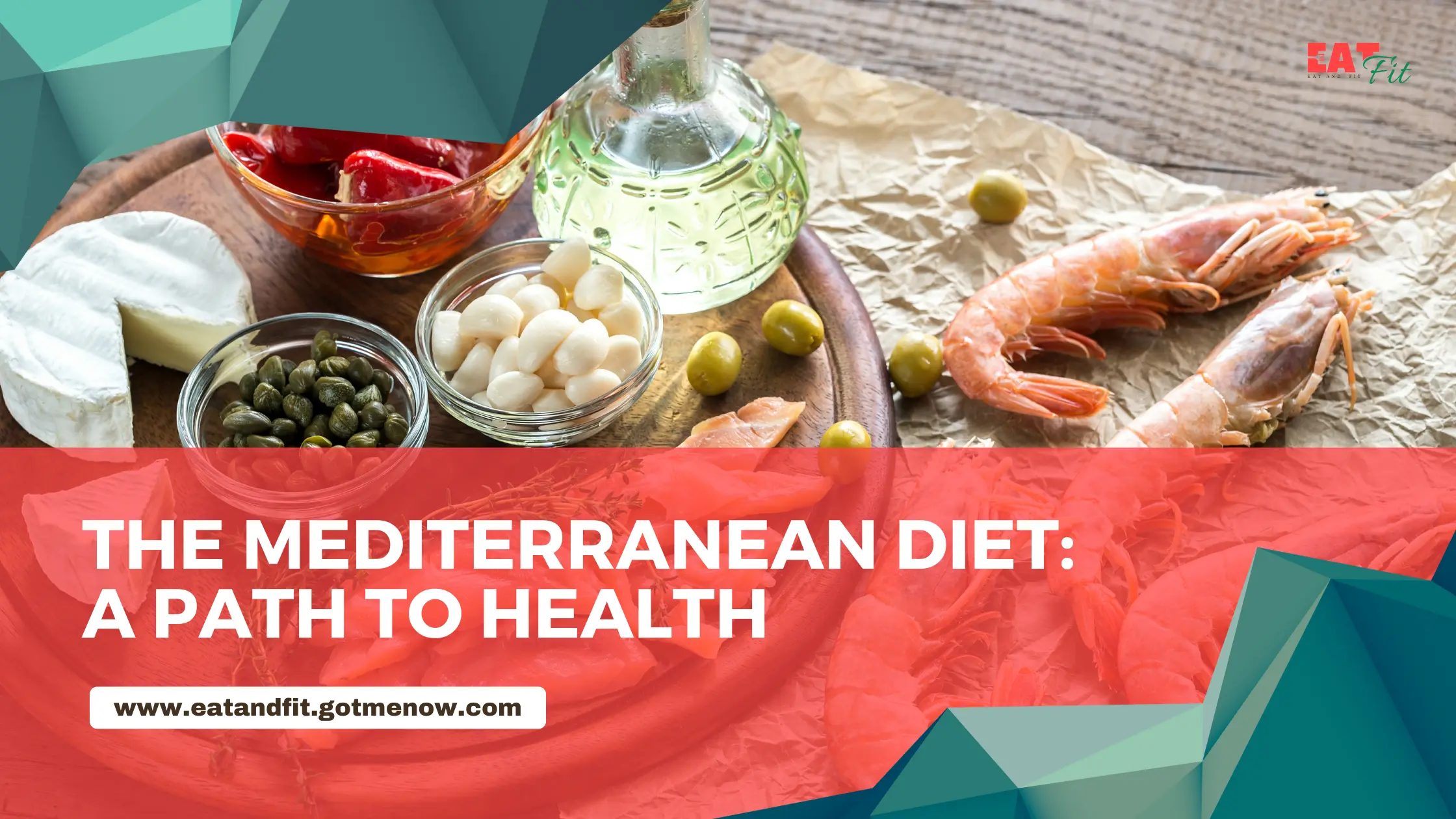The Benefits of the Mediterranean Diet: A Guide to Healthy Living

Table of Contents
- Introduction
- What is the Mediterranean Diet?
- Health Benefits
- Incorporating the Mediterranean Diet
- The Secrets to a Longer, Healthier Life
- Fun Facts and Additional Benefits
- FAQs
Introduction
Have you ever heard of the Mediterranean diet? It’s a popular eating plan that emphasizes plant-based foods and healthy fats. Inspired by the Greek lifestyle, this diet has gained attention for its numerous health benefits and has become a favorite among many people. In this section, we will explore the Mediterranean diet in more detail and discuss why it has become so popular.
Overview of the Mediterranean Diet
The Mediterranean diet is a way of eating that originated in the 1950s when researchers noticed that people living in the Mediterranean region, particularly in countries like Greece and Italy, had better overall health compared to others. The diet is primarily plant-based and includes whole grains, fruits, vegetables, beans, legumes, and healthy fats. It also emphasizes the consumption of fish instead of red meat as the primary source of protein.
The Authentic Mediterranean Diet: Debunking Myths and Revealing the Real Deal
Inspiration from the Greek Lifestyle
The Greek lifestyle has long been admired for its focus on health and well-being. With their balanced approach to eating and regular physical activity, the Greeks have served as inspiration for the Mediterranean diet. By incorporating elements of the Greek lifestyle, such as daily movement, stress management, and strong social connections, the Mediterranean diet aims to promote not just physical health but also mental and emotional well-being.
Importance of Plant-Based Foods and Healthy Fats
One of the key principles of the Mediterranean diet is the emphasis on plant-based foods and healthy fats. Whole grains, fruits, vegetables, beans, legumes, olive oil, avocados, nuts, and fish are all staples of this eating plan. These foods are rich in essential nutrients, vitamins, minerals, and fiber, which are essential for maintaining good health and preventing chronic diseases.
Health Benefits

The Mediterranean diet is renowned for its numerous health benefits. The American Heart Association recognizes it as a way to prevent heart disease and stroke by reducing risk factors such as obesity, hypertension, and diabetes. Studies have also shown that this diet can lower the risk of heart disease in women by 25% and the risk of dementia by 23%. Additionally, the Mediterranean diet has been associated with a reduced risk of certain types of cancer and improved sleep quality.
Popularity of the Diet
Given its health benefits and delicious food options, it’s no wonder that the Mediterranean diet has become immensely popular. Experts consistently rank it as one of the best diets due to its nutrient-rich foods, family-friendly nature, and ease of maintenance. Unlike crash or fad diets, the Mediterranean diet is sustainable and can be enjoyed for the long term.
What is the Mediterranean Diet?
The Mediterranean diet is a popular eating plan that originated in the 1950s and is inspired by the Greek lifestyle. It has gained attention for its numerous health benefits and has become a favorite among many people.
Origin and history of the Mediterranean diet
The term “Mediterranean diet” first appeared in the 1950s when researchers noticed that people living in the Mediterranean region, particularly in countries like Greece and Italy, had better overall health compared to others. The diet is a reflection of the lifestyle, social structures, and eating habits of these regions.
Key components of the diet
The Mediterranean diet is primarily plant-based and emphasizes the consumption of whole grains, fruits, vegetables, beans, legumes, and healthy fats. It also includes moderate amounts of dairy products and red wine. The diet discourages the consumption of processed foods, refined sugars, and saturated fats.
Emphasis on plant-based foods
One of the main principles of the Mediterranean diet is the emphasis on plant-based foods. These foods provide essential nutrients, vitamins, minerals, and fiber, which are necessary for maintaining good health and preventing chronic diseases.
Inclusion of healthy fats
The Mediterranean diet includes healthy fats such as olive oil, avocados, nuts, and seeds. These fats are an important part of the diet and provide numerous health benefits, including improved heart health and brain function.
Preference for fish as a protein source
Instead of consuming red meat as the primary source of protein, the Mediterranean diet encourages the consumption of fish. Fish is rich in omega-3 fatty acids, which have been shown to reduce the risk of heart disease and improve overall health.
Nourishing Your Metabolism: Recipes and Meal Ideas for Optimal Health
Health Benefits
The Mediterranean diet is not only delicious but also offers a multitude of health benefits. Let’s explore some of the key advantages:
American Heart Association’s recognition of the diet
The American Heart Association recognizes the Mediterranean diet as a way to prevent heart disease and stroke. By following this diet, you can reduce risk factors such as obesity, hypertension, and diabetes, leading to a healthier heart and circulatory system.
Reduction in risk factors for heart disease and stroke
Research has shown that the Mediterranean diet can lower the risk of heart disease in women by 25%. The consumption of nutrient-rich foods and the avoidance of processed and unhealthy options contribute to better cardiovascular health and a decreased chance of stroke.
Specific benefits for women’s heart health and dementia risk
For women, the Mediterranean diet has shown remarkable benefits, including a lower risk of heart disease and a 23% reduction in the risk of dementia. The combination of whole grains, fruits, vegetables, healthy fats, and fish in this diet provides essential nutrients that support heart and brain health.
Consistent high ranking of the diet by experts
Experts consistently rank the Mediterranean diet as one of the best eating plans due to its numerous health benefits. The diet’s nutrient-rich foods, family-friendly nature, and ease of maintenance make it a sustainable option for long-term health.
Nutrient-rich and family-friendly nature of the diet
The Mediterranean diet is rich in essential nutrients, vitamins, minerals, and fiber. By incorporating a variety of plant-based foods, healthy fats, and seafood, you can ensure that your body receives the necessary nourishment for optimal health. Moreover, the diet is family-friendly, allowing everyone to enjoy delicious and nutritious meals together.

Incorporating the Mediterranean Diet
When it comes to the Mediterranean diet, it’s important to view it as a lifestyle change rather than a crash diet. This eating plan is not about quick fixes or drastic measures, but rather about adopting a sustainable way of eating that can be enjoyed for the long term.
One of the great things about the Mediterranean diet is its flexibility. It can be modified to suit individual tastes and preferences. If you don’t particularly enjoy certain foods or ingredients, feel free to make substitutions. For example, if you’re not a fan of fish, you can opt for other lean sources of protein like chicken or tofu.
Another benefit of the Mediterranean diet is its affordability and family-friendliness. The diet emphasizes whole grains, fruits, vegetables, and legumes, which are generally more affordable than processed or convenience foods. It’s also a great way to get the whole family involved in healthy eating. You can try new recipes together, explore different flavors, and enjoy meals as a family.
One of the keys to success with the Mediterranean diet is to take advantage of local options and convenience. Visit your local farmer’s market to source fresh, seasonal produce. Look for local stores or suppliers that offer Mediterranean ingredients like olive oil, avocados, and nuts. By choosing local options, you not only support local businesses but also ensure the freshest and highest quality ingredients.
Finally, it’s important to emphasize the importance of long-term adherence to the Mediterranean diet for maximum benefits. While it’s tempting to go on a strict diet for a short period of time, the real benefits come from making this way of eating a habit. Consistency is key. By sticking to the principles of the Mediterranean diet over the long term, you can reap the full range of health benefits that this lifestyle offers.
The Secrets to a Longer, Healthier Life
While the Mediterranean diet is known for its numerous health benefits, there are additional factors that contribute to a longer, healthier life. Let’s explore some of these secrets:
Exploring other factors contributing to longevity
In addition to following a healthy eating plan like the Mediterranean diet, it’s important to consider other lifestyle factors that contribute to longevity. Research has shown that daily movement and engaging in hobbies can have a positive impact on overall health and well-being. Finding activities that you enjoy and incorporating them into your daily routine can help increase physical fitness and mental well-being.
Daily movement and hobbies
Regular physical activity is essential for maintaining good health and preventing chronic diseases. Whether it’s going for a walk, practicing yoga, or playing a sport, finding ways to incorporate movement into your daily life is key. Additionally, engaging in hobbies and activities that bring you joy can help reduce stress and promote a sense of purpose and fulfillment.
Managing stress and finding purpose
Stress can have a negative impact on both physical and mental health. Finding effective ways to manage stress, such as practicing mindfulness or engaging in relaxation techniques, is crucial for overall well-being. Additionally, having a sense of purpose and finding meaning in life can contribute to a longer, healthier life. This can be achieved through engaging in meaningful work, volunteering, or pursuing hobbies and interests that bring you joy.
Value of family, friends, and faith
Strong social connections and a support system are important for overall health and well-being. Spending time with loved ones, cultivating meaningful relationships, and participating in community activities can help reduce stress and improve mental health. Additionally, for those who have faith or spiritual beliefs, studies have shown that having a strong sense of faith can contribute to better health outcomes and increased longevity.
The role of diet in overall well-being
While the Mediterranean diet is a key component of a longer, healthier life, it’s important to remember that diet is just one piece of the puzzle. Incorporating a variety of nutrient-rich plant-based foods, healthy fats, and lean proteins can provide essential nutrients for optimal health. However, it’s also important to practice portion control, stay hydrated, and listen to your body’s hunger and fullness cues.
Fun Facts and Additional Benefits
Aside from its numerous health benefits, the Mediterranean diet is also associated with several fun facts and additional benefits:
Link between the Mediterranean diet and sleep quality
Research has shown that individuals who follow the Mediterranean diet tend to have better sleep quality. The consumption of nutrient-rich foods, such as fruits, vegetables, and whole grains, along with healthy fats, can contribute to improved sleep patterns and overall sleep quality.
Improved sleep duration
In addition to sleep quality, the Mediterranean diet has also been linked to improved sleep duration. By incorporating foods that support good sleep, such as foods rich in tryptophan (an amino acid that promotes sleep), individuals following the Mediterranean diet may experience longer and more restful sleep.
Overall enhancement of well-being
Following the Mediterranean diet can lead to an overall enhancement of well-being. The diet’s focus on nutritious whole foods, physical activity, stress management, and strong social connections can contribute to improved mental, emotional, and physical well-being. By adopting the Mediterranean lifestyle, individuals can experience a greater sense of vitality and happiness.
Positive impact on various aspects of health
The Mediterranean diet has been found to have a positive impact on various aspects of health. In addition to reducing the risk of heart disease and stroke, it has also been associated with a lower risk of certain types of cancer, improved cognitive function, and a decreased risk of chronic diseases such as diabetes and obesity. By following the Mediterranean diet, individuals can improve their overall health and reduce the risk of several diseases.
Encouragement to incorporate the diet
Given the numerous benefits and additional advantages of the Mediterranean diet, it is highly encouraged to incorporate this way of eating into your daily life. By following the Mediterranean diet, you can enjoy delicious and nutrient-rich meals, improve your sleep quality and duration, enhance your well-being, and promote better overall health. So why not start incorporating Mediterranean-inspired dishes into your meals today?
FAQs
Thank you for reading our guide to the Mediterranean diet! Here are some frequently asked questions:
Answering questions from the audience
Q: What is the Mediterranean diet?
A: The Mediterranean diet is a popular eating plan that originated in the 1950s and is inspired by the Greek lifestyle. It emphasizes plant-based foods and healthy fats, such as whole grains, fruits, vegetables, beans, legumes, olive oil, avocados, nuts, and fish.
Addressing common concerns
Q: Can I make substitutions in the Mediterranean diet?
A: Yes! The Mediterranean diet is flexible and can be modified to suit individual tastes and preferences. If you don’t enjoy certain foods or ingredients, feel free to make substitutions. For example, if you don’t like fish, you can opt for other lean sources of protein like chicken or tofu.
Providing additional tips and advice
Q: How can I incorporate the Mediterranean diet into my daily life?
A: To incorporate the Mediterranean diet, view it as a lifestyle change rather than a crash diet. Take advantage of local options and convenience by visiting your local farmer’s market for fresh, seasonal produce. Look for local stores or suppliers that offer Mediterranean ingredients like olive oil, avocados, and nuts. Also, involve your family in healthy eating by trying new recipes together and enjoying meals as a family.
Offering resources for further information
Q: Where can I find more information about the Mediterranean diet?
A: There are many resources available online and in books that provide more information and recipes for the Mediterranean diet. Some recommended sources include cookbooks by Mediterranean chefs, reputable health websites, and the official websites of organizations like the American Heart Association and the CDC.
Promoting engagement on social media
Q: How can I engage with others following the Mediterranean diet?
A: Join the conversation on social media! Share your Mediterranean-inspired meals, ask questions, and connect with others who are also following the diet. You can use popular health and food-related hashtags to find like-minded individuals and communities.
We hope this FAQ section has answered some of your questions and provided additional tips and resources for incorporating the Mediterranean diet into your life. Remember, the Mediterranean diet is not just a way of eating, but a lifestyle that promotes overall health and well-being.








